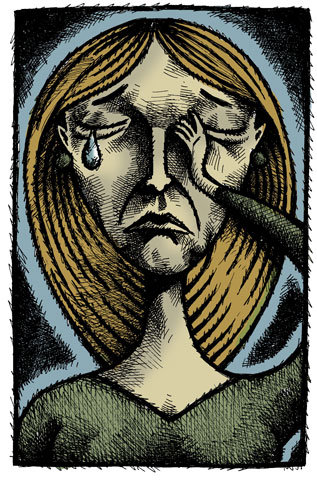
(Paul Lachine)
This winter, three good friends and four admired colleagues died. As my generation winks out, there is plenty of time at funerals to think about grief and comforting the brokenhearted. It isn't easy.
When death cuts down a life intertwined with mine, I'm depleted. Waves of pain and powerlessness wash over me and weigh me down. Premature, violent deaths are the hardest to bear. After 9/11, I went to the funeral of a young man last seen helping his co-workers down a fiery staircase. Patrick was mourned by his pregnant wife, two toddlers, parents, four siblings and a sorrowful church full of friends and neighbors.
Last month, my husband and I sat in that same sanctuary, attending the funeral of our friend Michael, 89, a friend of 55 years. He had been a naval officer, convert from Judaism, Trappist novice, Ph.D. historian, witty novelist, father of four, teacher and counselor of many. After nursing his wife in her last decade of invalidism, Mike succumbed to illness and dementia. This loss was also a release, and our sorrow was mingled with gratitude for this good and full life.
But even the hardest death blows can be healed -- eventually. The innate cycling of emotions continues to bring good moments. In the midst of tears, a stab of joy can well up at a beautiful hymn, a kind gesture, a loving memory. Great saints may always be able to retain a deep core of divine assurance while they weep with those who weep. Lesser folk can laugh in the midst of the gathering of fellow mourners, as in the fabled Irish wake.
Healing takes place through our encounters with love and beauty. Worship, prayer, family bonding and friends sustain us. Work and meetings engage and distract us. The innate capacities of human memory come to our aid. We can call to mind the past life of those who have gone, and more and more assimilate their lives into ours. The pain of their dying recedes into the whole of their life story. As the absent become present in mind and heart, we are healed.
"Yes, that's how it was for me," responded a woman at a bereavement conference. She had lost her fireman son in the 9/11 conflagration. His wife, mother, brother and three small children were devastated. As this grandmother struggled on, she came to realize that her son would not want the family to sink into suffering. So her healing journey began when she had "pulled herself together" and turned to life again. Now she and her family and grandchildren could reminisce and laugh again. "I feel my son is with me in my heart."
Sometimes it can take an act of will not to succumb to despair. I was reminded by this woman's story that I too once had made a clear choice to turn away from grief's tidal pull to destruction. After the sudden infant death of our fourth son, on my 28th birthday, I wanted to give up on life. But my three little boys needed me to get up and care for them; they must have a childhood filled with joy, not sadness. And so we had three more children and a future filled with much gladness. Then, 18 years ago on my birthday, a crowning blessing arrived with the birth of my first granddaughter. Babies, God knows, bring balm in Gilead like nothing else in this world.
In the world to come, the promise that death is no more gives the great hope of faith. While no eye has ever seen or mind imagined what God has in store for the future, it surely includes our heart's desire: reunion with those we have lost. Only then can every tear be wiped away. When the saints go marching in, we want to be in that number, united with all our kith and kin.
[Sidney Callahan is an author, lecturer, college professor and licensed psychologist. Her most recent book is Called to Happiness: Where Faith and Psychology Meet.]



